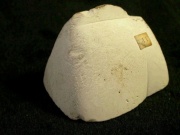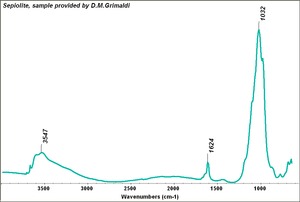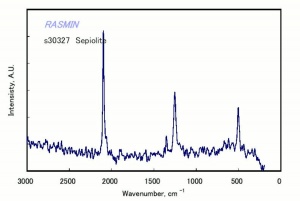Difference between revisions of "Sepiolite"
m (Text replace - "\[http:\/\/cameo\.mfa\.org\/materials\/fullrecord\.asp\?name=([^\s]+)\s(.*)\]" to "$2") |
|||
| (2 intermediate revisions by 2 users not shown) | |||
| Line 5: | Line 5: | ||
2) (not common) A powder composed of ground [[cuttlebone|cuttlefish bones]]. Sepiolite, also called sepia powder, is composed of [[calcium%20carbonate|calcium carbonate]] and [[calcium%20phosphate|calcium phosphate]]. It is used as a polishing agent. | 2) (not common) A powder composed of ground [[cuttlebone|cuttlefish bones]]. Sepiolite, also called sepia powder, is composed of [[calcium%20carbonate|calcium carbonate]] and [[calcium%20phosphate|calcium phosphate]]. It is used as a polishing agent. | ||
| − | + | [[[SliderGallery rightalign|Sepiolite.TIF~FTIR (MFA)|sepioliteRS.jpg~Raman]]] | |
== Synonyms and Related Terms == | == Synonyms and Related Terms == | ||
| Line 12: | Line 12: | ||
2) sepia powder; sepiolita (Esp.); sepiolite (Fr.); Sepiolit (Deut.); Meerschaum (Deut.) | 2) sepia powder; sepiolita (Esp.); sepiolite (Fr.); Sepiolit (Deut.); Meerschaum (Deut.) | ||
| − | + | ==Physical and Chemical Properties== | |
| − | |||
| − | == | ||
Amorphous. Can float on water. | Amorphous. Can float on water. | ||
| Line 27: | Line 25: | ||
|- | |- | ||
! scope="row"| Density | ! scope="row"| Density | ||
| − | | 2.0 | + | | 2.0 g/ml |
|} | |} | ||
| − | == | + | ==Resources and Citations== |
| − | |||
| − | |||
| − | + | * J.Heuman, K.Garland, "A Poultice Technique for the Removal of Cellulose Nitrate Adhesive from Textiles" ''The Conservator'', No. 11, 1987. | |
* Thomas Gregory, ''The Condensed Chemical Dictionary'', Reinhold Publishing, New York, 3rd ed., 1942 | * Thomas Gregory, ''The Condensed Chemical Dictionary'', Reinhold Publishing, New York, 3rd ed., 1942 | ||
| Line 46: | Line 42: | ||
* ''The American Heritage Dictionary'' or ''Encarta'', via Microsoft Bookshelf 98, Microsoft Corp., 1998 | * ''The American Heritage Dictionary'' or ''Encarta'', via Microsoft Bookshelf 98, Microsoft Corp., 1998 | ||
| + | * Gordon Hanlon, contributed information, 1998 | ||
[[Category:Materials database]] | [[Category:Materials database]] | ||
Latest revision as of 14:27, 23 October 2022
Description
1) A hydrated magnesium silicate Clay that is also called Meerschaum. Sepiolite is a fine-grain, grayish-white clay that occurs in Asia Minor, Morocco, Spain, New Mexico, and Pennsylvania. The light porous clay can be cut easily when it is wet and will withstand heat well. It is used as a building stone, a filler in soaps, and for making ornamental pipes and cigar holders. It is also sold as a commercial product under the name Sepiolite. Sepiolite has also been used as a poulticing material for cleaning stains from Stone and textiles (Heuman and Garland 1987).
2) (not common) A powder composed of ground cuttlefish bones. Sepiolite, also called sepia powder, is composed of Calcium carbonate and Calcium phosphate. It is used as a polishing agent.
Synonyms and Related Terms
1) meerschaum; sea foam
2) sepia powder; sepiolita (Esp.); sepiolite (Fr.); Sepiolit (Deut.); Meerschaum (Deut.)
Physical and Chemical Properties
Amorphous. Can float on water.
| Composition | Mg4Si6O15(OH)2-6H2O |
|---|---|
| Mohs Hardness | 2.0 - 2.5 |
| Density | 2.0 g/ml |
Resources and Citations
- J.Heuman, K.Garland, "A Poultice Technique for the Removal of Cellulose Nitrate Adhesive from Textiles" The Conservator, No. 11, 1987.
- Thomas Gregory, The Condensed Chemical Dictionary, Reinhold Publishing, New York, 3rd ed., 1942
- G.S.Brady, Materials Handbook, McGraw-Hill Book Co., New York, 1971 Comment: p. 500
- Meredith Montague, contributed information, 1998
- Van Nostrand's Scientific Encyclopedia, Douglas M. Considine (ed.), Van Nostrand Reinhold, New York, 1976
- The American Heritage Dictionary or Encarta, via Microsoft Bookshelf 98, Microsoft Corp., 1998
- Gordon Hanlon, contributed information, 1998


